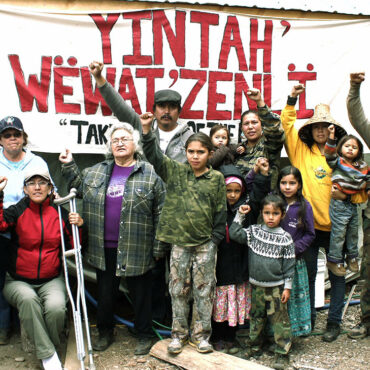Reoccupying traditional territory and revitalizing cultural practices
British Columbia, Canada
For the past nine years, under the direction of their hereditary chiefs and elders, members of the Unist’ot’en Clan of the Wet’suet’en Nation have been working to reoccupy their traditional territory and revitalize cultural practices among their people.
The Unist’ot’en have constructed three buildings and a pit house on their traditional land. They occupy the territory year round and are able to house and feed up to 60 people at a time with indoor accommodations. The latest of the three buildings is the Unist’ot’en healing centre, which is specifically intended to be a treatment facility for Indigenous People to access counselling and participate in artistic residencies. Unist’ot’en’s work is entirely governed by their traditional laws and hereditary decision-making system. The camp is led by Unist’ot’en spokesperson Freda Huson and the majority of the chiefs of the Unist’ot’en territory are women, as the Unist’ot’en are a matriarchal society. The camp is located along the proposed route of multiple LNG pipelines, including Coastal GasLink.
“All Wet’-suwet’en Clans have rejected the pipeline because our medicines, our food, and our water are all here and not replaceable. These legal challenges ignore the jurisdiction and authority of hereditary chiefs and our feast system of governance, which was recognized in the 1997 Deglamuukw-Gisday’wa Supreme Court case.”
Freda Huson, spokesperson
